|
|
|
Sort Order |
|
|
|
Items / Page
|
|
|
|
|
|
|
| Srl | Item |
| 1 |
ID:
079924
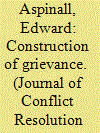

|
|
|
|
|
| Publication |
2007.
|
| Summary/Abstract |
This article makes a case for extending social constructivist approaches to the study of grievance in natural resource conflicts. It does this by analyzing the separatist conflict in Aceh, Indonesia, which is often portrayed as a paradigmatic resource conflict due to the importance of the natural gas industry there. It is argued here, however, that natural resource exploitation promoted conflict in Aceh only because it became entangled in wider processes of identity construction and was reinterpreted back to the population by ethnic political entrepreneurs in a way that legitimated violence. Rather than any intrinsic qualities of natural resource extraction, the key factor was the presence of an appropriate identity-based collective action frame. The argument is strengthened by comparison with two other resource-rich Indonesian provinces where resource extraction patterns were similar to Aceh but where no protracted violence occurred because similar identity resources were not available to local actors
|
|
|
|
|
|
|
|
|
|
|
|
|
|
|
|
| 2 |
ID:
076751
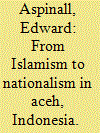

|
|
|
|
|
| Publication |
2007.
|
| Summary/Abstract |
This article analyses a dramatic political transformation in Indonesia's Aceh province. In the 1950s, an Islamic rebellion (Darul Islam) aimed not to separate Aceh from Indonesia, but rather to make Indonesia an Islamic state. A successor movement from the 1970s was GAM, the Free Aceh Movement. GAM, however, was essentially secular-nationalist in orientation, sought Aceh's complete independence and did not espouse formal Islamic goals. The transformation is explained by various factors, but the key argument concerns the relationship between Islam and nationalism. The defeat of Darul Islam had caused Aceh's Islamic leaders to focus on what they could achieve in Aceh alone, ultimately giving rise to Acehnese nationalism and the secessionist goal. However, Islam remained a point of commonality with, rather than difference from, majority-Muslim Indonesia. The logic of nationalist identity construction and differentiation thus caused Aceh's separatist leaders, despite being personally devout, to increasingly downplay Islamic symbols and ideology.
|
|
|
|
|
|
|
|
|
|
|
|
|
|
|
|
| 3 |
ID:
183390


|
|
|
|
|
| Publication |
Washington, D C, East - West Center Washington, 2005.
|
| Description |
x, 104p.pbk
|
| Standard Number |
9781932728385
|
|
|
|
|
|
|
|
|
|
|
|
Copies: C:1/I:0,R:0,Q:0
Circulation
| Accession# | Call# | Current Location | Status | Policy | Location |
| 060140 | 959.8/ASP 060140 | Main | On Shelf | General | |
|
|
|
|
| 4 |
ID:
060662


|
|
|
| 5 |
ID:
193131
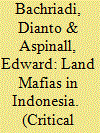

|
|
|
|
|
| Summary/Abstract |
In Indonesia, “land mafias” (mafia tanah) proliferate, alongside mafias that cluster around other commodities and state functions. We analyze the composition, character, modes, and sources of resilience of Indonesian land mafias, noting similarities with formations elsewhere, especially India. While taking care to avoid reifying the category, we view land mafias as opportunistic networks, or assemblages, of diverse actors including land brokers, investors, lawyers, gangsters, bureaucrats, law enforcement officers, and politicians. Their goal is to harvest rents from the transfer of ownership and control over land. They feature two elements: first, reliance on coercion (not always physical violence but always entailing transfer of property without freely-given consent, often via fraud or manipulation); second, institutional amorphousness crossing the state-society boundary. We analyze four modes of land mafia operation, though their nebulousness defies easy categorization. In explaining land mafia resilience, we acknowledge Indonesia’s property boom as a driver, but note that the ubiquity of mafias points to a more fundamental explanation: a variety of state formation involving pervasive engagement by state actors in illegal behavior in collusion with wealthy private actors. Mafias are central to Indonesian state formation, rather than aberrations. Feedback loops that incentivize illegal behavior make land mafias difficult to eradicate.
|
|
|
|
|
|
|
|
|
|
|
|
|
|
|
|
| 6 |
ID:
119704
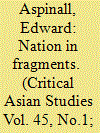

|
|
|
|
|
| Publication |
2013.
|
| Summary/Abstract |
Scholars of Indonesia are still searching for ways to characterize the ordering principles of the new post-Suharto politics. In the 1950s and 1960s, Clifford Geertz's notion of aliran (stream) politics captured central features of Indonesian political life. In the 1970s and 1980s, the state took center stage, with scholars seeing the New Order state as standing above society, depoliticizing and reordering it. Since reform began in 1998, these analyses are clearly no longer adequate, but scholars have yet to find persuasive alternatives. This article offers one attempt to diagnose the fundamentals of political organization in contemporary Indonesia. It starts by emphasizing the organizational fragmentation that characterizes much contemporary political life. It seeks the origins of this fragmentation in two sources: the ubiquity of patronage distribution as a means of cementing political affiliations and the broader neoliberal model of economic, social, and cultural life in which patronage distribution is increasingly embedded. These two forces are often portrayed as being incompatible, but in practice they are frequently intertwined. This argument is first substantiated by reference to the project (Indonesian: proyek), a mechanism for distributing economic resources that is pervasive in Indonesia. The proyek formally adheres to the expectations of transparency and competition associated with neoliberalism, but is also a major source of patronage. Proyek-hunting drives much of the fragmentation in contemporary Indonesian political and social organization. The argument is then illustrated with examples drawn from four spheres: state structures, political parties, non-governmental organizations and Islamic politics.
|
|
|
|
|
|
|
|
|
|
|
|
|
|
|
|
| 7 |
ID:
092231


|
|
|
|
|
| Publication |
Stanford, Stanford University Press, 2005.
|
| Description |
xiii, 328p.
|
| Series |
Contemporary issues in Asia and the pacific
|
| Standard Number |
9780804748452
|
|
|
|
|
|
|
|
|
|
|
|
Copies: C:1/I:0,R:0,Q:0
Circulation
| Accession# | Call# | Current Location | Status | Policy | Location |
| 054597 | 320.959809049/ASP 054597 | Main | On Shelf | General | |
|
|
|
|
| 8 |
ID:
151655
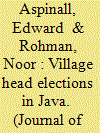

|
|
|
|
|
| Summary/Abstract |
To explore how democratisation is transforming Indonesia's rural elite, we examine two village head elections in Central Java. Despite the competitiveness of these elections, the campaigning modes employed by candidates, especially vote buying, points to elite continuity, because only wealthy villagers can compete for office. Moreover, links with higher state officials remain important for village elites, allowing them to win political support by obtaining projects from local government. However, rather than being incorporated as subordinates in a bureaucratic hierarchy as during authoritarian rule, village elites are now true rural brokers, exercising considerable leverage in their relations with the state.
|
|
|
|
|
|
|
|
|
|
|
|
|
|
|
|
| 9 |
ID:
159178
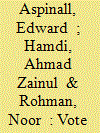

|
|
|
|
|
| Summary/Abstract |
What underlying logic explains candidate participation in vote buying, given that clientelist exchange is so difficult to enforce? We address this question through close analysis of campaigns by several dozen candidates in two electoral districts in Java, Indonesia. Analyzing candidates’ targeting and pricing strategies, we show that candidates used personal brokerage structures that drew on social networks to identify voters and deliver payments to them. But these candidates achieved vote totals averaging about one quarter of the number of payments they distributed. Many candidates claimed to be targeting loyalists, suggestive of “turnout buying,” but judged loyalty in personal rather than partisan terms, and extended their vote-buying reach through personal connections mediated by brokers. Candidates were market sensitive, paying prices per vote determined not only by personal resources, but also by constituency size and prices offered by competitors. Accordingly, we argue that a market logic structures Indonesia's system of vote buying.
|
|
|
|
|
|
|
|
|
|
|
|
|
|
|
|
| 10 |
ID:
134600


|
|
|
|
|
| Summary/Abstract |
Research in many countries shows that where voters and campaign workers are motivated by material rewards, the brokerage networks delivering those rewards can be highly unstable. Brokers often exercise considerable autonomy, shifting between candidates, disobeying their directives, or stealing the cash or goods they are supposed to pass on to voters. What determines whether brokers betray their ca ndidates in such ways? This article answers this question by focusing on elections in Indonesia, where candidates construct ad-hoc “success teams” to organize brokers and mobilize voters. In proposing a model to explain broker behavior, the author proposes the division of team members into three categories: activist brokers, who support a candidate based on a political, ethnic, religious, or other commitment; clientelist brokers, who desire long-term relations with the candidate or with more senior brokers, with the goal of receiving future rewards; and opportunist brokers, who seek short-term material gains during the course of a campaign. Two problems of broker loyalty are then discussed, specifically: predation, where brokers misappropriate resources intended for voters or lower-level team members, and defection, where they desert one candidate in favor of another. Explaining the incidence of these phenomena, the author examines two key factors: the material endowments of candidates and broker evaluations of their prospects of electoral victory. Well-resourced candidates with poor prospects are most likely to experience predation, whereas less materially endowed candidates will experience defection. The article concludes by addressing the implications for studies of clientelism and brokerage.
|
|
|
|
|
|
|
|
|
|
|
|
|
|
|
|
| 11 |
ID:
103505


|
|
|
|
|
| Publication |
2011.
|
| Summary/Abstract |
The authors analyse the 2010 mayoral election in the city of Medan, North Sumatra. Medan is an ethnically and religiously diverse city and the authors treat the elections here as a case study of inter-communal dynamics in local elections in plural regions of Indonesia. The first round of the vote was contested by 10 pairs of candidates and occurred in a climate of cross-ethnic alliance building and appeals that, the authors argue, are typical of broader Indonesian patterns. The second round confronted voters with a choice between a Muslim candidate and an ethnic Chinese candidate who was also a Buddhist. There was a sudden switch in the tone and themes of the contest. A concerted campaign was launched to convince Muslim voters to support the Muslim candidate, with politicians and religious leaders alike suggesting that it was a religious obligation to do so. The campaign proved effective and the Muslim candidate, a member of the province's established political elite, won by a large margin. The article focuses on the campaign teams' strategies, analysing their electoral calculations and the techniques used to appeal to a multi-ethnic constituency. It also considers the role played in the poll by Medan's rich array of ethnic associations. The authors conclude by pointing to lessons of the Medan case for wider patterns of ethnic coalition building in Indonesia. They also describe this election as an example of the 'identity switching' that can take place when political actors choose from multiple and overlapping identity categories in changing political contexts.
|
|
|
|
|
|
|
|
|
|
|
|
|
|
|
|
|
|
|
|
|